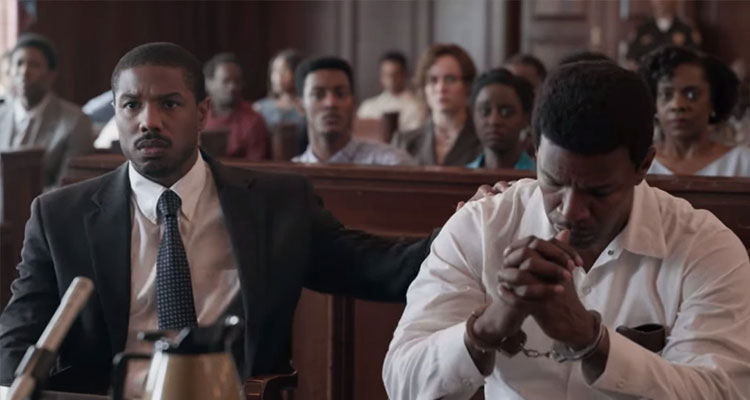Just Mercy (USA / 12A / 137 mins)
In short: Powerful
Directed by Destin Daniel Cretton. Starring Michael B. Jordan, Brie Larson, Jamie Foxx, Tim Blake Nelson, Rafe Spall, O’Shea Jackson Jr.
The Plot: 1992. Bryan (Michael B. Jordan) is a graduate of the distinguished Harvard Law School. However, his career has taken him south to Monroeville, Alabama. An idealistic young lawyer who believes in the power of justice, he has a particular interest in Death Row prisoners and the potential for these men to be victims of miscarriages of justice. He’s especially drawn to the story of Walter (Jamie Foxx), a man convicted of the murder of a teenager. Walter has always maintained his innocence, but time on Death Row has gradually worn him down to believe that there’s no hope of his case being re-opened. With the help of local Eva (Brie Larson), he re-examines Walter’s case and discovers cracks. Small cracks, but enough to be torn open if challenged. However, they meet a wall of resistance from the local police and the new District Attorney Tommy (Rafe Spall), who is determined to keep Walter where he belongs…
The Verdict: As the end credits roll on legal drama Just Mercy, a startling statistic is laid bare in black and white. For every nine people executed in the US, one person on death row has been exonerated. That’s a sobering fact from the Equal Justice Initiative, of whom the founders are the subject of this film. Much like the Innocence Project, they’re committed to re-opening cases of potential wrongful convictions – but with a focus on Death Row prisoners who have nothing left but borrowed time until their date of execution. As much as we like to think the legal system is fair and just, it’s also a human-designed system and therefore has the potential for flaws. That’s the theme behind Just Mercy, which is based on the true story of Walter McMillian and Bryan’s fight to get him home to his family before it’s too late.
Based on the book by Bryan Stevenson himself, Just Mercy follows familiar tropes of smalltown, Southern-fried legal dramas like A Time To Kill and Mississippi Burning. An outsider comes into a close-knit community to re-open old wounds and faces resistance from the townsfolk and an uncooperative local law enforcement. However, there’s less of the theatrics and uneasy atmosphere and more contemplation on the search for that sometimes elusive concept: justice. It’s a word that’s mentioned several times in Bryan’s passionate speeches to judges as he attempts to get Walter’s case re-opened. The fact that the story takes place in the town that Harper Lee wrote her landmark novel To Kill A Mockingbird is not lost on the audience. It’s a minor detail, but it echoes through elements of Walter’s story. Can a black man get a fair trial in the South?
That’s a question for audiences to mull over afterwards, but the real meat of this powerful story is in what happens after the trial and conviction. While having sympathy for Death Row prisoners is not something that people are naturally inclined towards, director Destin Daniel Cretton has constructed his drama around quiet, intimately-shot scenes which portray these men as either regretting their actions and deserving their fate or firmly believing that they are innocent. The star witness in Walter’s case is a shifty convict himself, played with nervous energy by an excellent Tim Blake Nelson. The scenes between him and Jordan could go either way at any moment, keeping audiences on the edge of their seat. This is a story with many twists and turns, not all of the predictable.
Along with Cretton’s well-paced script and careful direction, another stand-out is Foxx. He plays a man whose spirit is nearly broken by the legal system, but there’s a quiet resolve buried deep down to just hang in there a little longer in the hope of change. It’s a considered, internalised performance that feels earned as the story reaches its tense conclusion. Just Mercy is not a preachy film though. It’s less about objections to some American states’ insistence on holding on to the death penalty (an eye for an eye and so on…) and more about delivering justice for those who believe they were denied it in the first place. After the forgettable The Last Castle, Cretton is back on form and showing the same eye for character detail as in his break-out hit Short Term 12. There’s also a growing maturity and confidence in his direction too, to tackle weightier subjects while keeping them entertaining too. You’ve been served… with a fine legal drama worth banging a gavel about.
Rating: 4 / 5
Review by Gareth O’Connor


